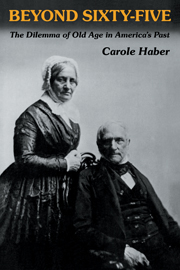Book contents
- Frontmatter
- Contents
- List of Tables
- Acknowledgments
- INTRODUCTION: Classifying Society's Superannuated
- CHAPTER ONE Aging in Colonial America
- CHAPTER TWO Social Realities and Perceptions of Old Age in the Nineteenth Century
- CHAPTER THREE Medical Models of Growing Old
- CHAPTER FOUR Treating the Postclimacteric Stage
- CHAPTER FIVE Institutionalizing the Elderly
- CHAPTER SIX The Pension Barrier
- CONCLUSION: Old Age in a Bureaucratic Society
- Notes
- A Note on Secondary Sources
- Index
CHAPTER ONE - Aging in Colonial America
Published online by Cambridge University Press: 26 February 2010
- Frontmatter
- Contents
- List of Tables
- Acknowledgments
- INTRODUCTION: Classifying Society's Superannuated
- CHAPTER ONE Aging in Colonial America
- CHAPTER TWO Social Realities and Perceptions of Old Age in the Nineteenth Century
- CHAPTER THREE Medical Models of Growing Old
- CHAPTER FOUR Treating the Postclimacteric Stage
- CHAPTER FIVE Institutionalizing the Elderly
- CHAPTER SIX The Pension Barrier
- CONCLUSION: Old Age in a Bureaucratic Society
- Notes
- A Note on Secondary Sources
- Index
Summary
In the eighteenth century, an individual who approached his sixth decade was almost certain to think of himself as growing old. Those “who have attained to threescore,” asserted an aged Increase Mather, “are everywhere accounted as old men.” In early America, such longevity seemed great indeed. The median age was not far from sixteen; most people died before forty. Only about 5 percent of the population lived beyond sixty. Thus, persons who survived to this extreme age often assumed a peculiar and highly visible status. In colonial New England, religious and civil leaders lectured on the glories inherent in old age. Through speeches and sermons, they expatiated on the nature of senescence and its rightful place in society. For Puritans, at least, old age seemed more than merely the last segment of the life cycle; it became a tangible expression of God's benevolent order. “There is,” declared Reverend Samuel Willard:
that Relation and Order that arises from the Condition of Man, whose God's Providence disposeth to dwell in such Societies … There are in all Places, some that are Aged, and others that are Younger, and both of these in Plenty are promised to a People whom God has blessed.
In this divinely appointed universe, each individual had age-related roles and responsibilities. Children, servants, and parents were joined in a well-established hierarchy of law and tradition. The old were to assume the highest rank, their longevity a sign from Providence of chosen status.
- Type
- Chapter
- Information
- Beyond Sixty-FiveThe Dilemma of Old Age in America's Past, pp. 8 - 27Publisher: Cambridge University PressPrint publication year: 1983

